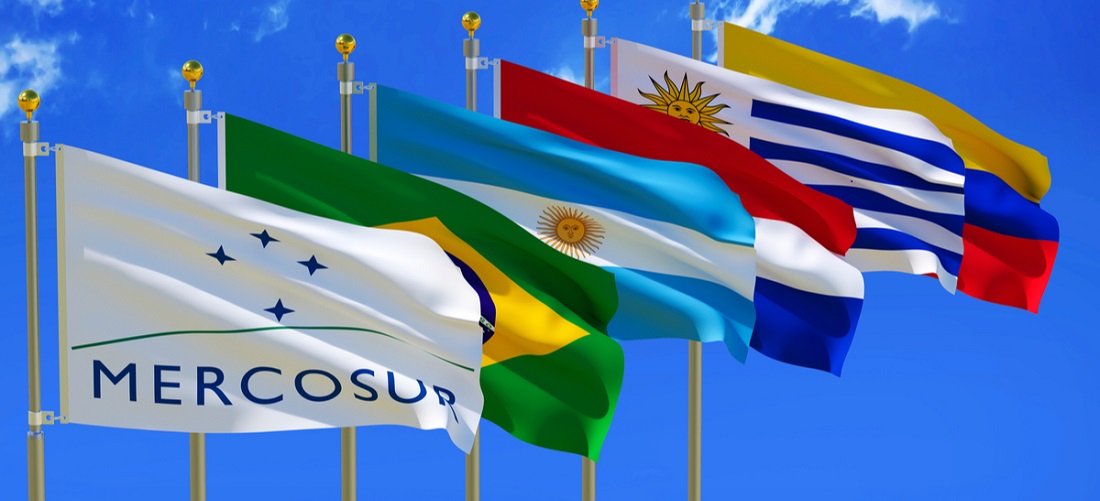
Uruguay’s global ambitions shake up Latin America’s Mercosur trade bloc
Dec, 28, 2022 Posted by Gabriel MalheirosWeek 202252
Presidential meetings of the South American Mercosur alliance were usually sedate affairs — until Uruguay decided to “open up to the world” under its pro-business leader Luis Lacalle Pou.
Hard at work negotiating new trade deals outside the regional bloc since taking office in March 2020, Lacalle Pou’s ambitions are running up against the other Mercosur members who are closing ranks on Uruguay, as political alliances shift.
Those tensions were on display at the Mercosur summit in the Uruguayan capital Montevideo in December. There were accusations of foul play and unsportsmanlike tactics on news that Uruguay had independently applied to join the Trans-Pacific Partnership days previously, an 11-member trade alliance including Australia and Japan. This followed separate bilateral trade talks with China and Turkey earlier this year.
“Uruguay needs to choose if it is with Mercosur,” Argentina’s foreign minister, Santiago Cafiero, told the Financial Times on the sidelines of the summit earlier this month, in which Uruguay transferred the Mercosur presidency to Argentina.
Together with Argentina, Brazil and Paraguay, Uruguay makes up the Mercosur partnership, a three-decades-old customs union in which no individual country is allowed to negotiate preferential agreements with third parties.
But some experts have described the protectionist alliance as one of the “least effective” of its kind anywhere in the world, both in terms of trade among its members and with external partners. It has also struggled to finalise a free trade agreement with the EU, a process that is entering its 24th year.
Those delays and frustrations are among the factors driving Montevideo’s mission to explore opening up to foreign markets alone. Mercosur can no longer lead “with an early 1990s mindset”, Lacalle Pou has said, or pull back a member’s economic progress.
Chile, Colombia, Peru and Mexico have all been looking towards the Pacific to expand trade with Asia. All have joined the TPP, with the exception of Colombia, while Mercosur has dawdled.
The three other Mercosur member states have called for regional unity, threatening to penalise Uruguay with a series of undisclosed measures if it continues to pursue commercial arrangements alone.
Critics describe the threats as bullying against the smaller country because it has triggered real discussions about restructuring the alliance, which could ultimately lead to a break-up. Argentina and Brazil account for nearly 90 percent of the bloc’s GDP, giving them more influence in negotiations. Some say the two bigger countries use Mercosur as a trade shield, to protect their industries from global competition.
Uruguay’s foreign minister maintains that the country wants to modernise, not cut away from the bloc, that represented roughly a third of overall Uruguayan trade in 2022.
Last week the Uruguay-China chamber of commerce reiterated its support for the steps taken by the Uruguayan government to deepen trade relations between the two economies, saying that “advancing” the FTA with China was “central” to their strategy.
Ignacio Bartesaghi, international relations professor at Uruguay’s Catholic University, said the Uruguayan government’s mistake had been to “take on too many deals at once”, unnerving members at a time of political change in Brazil, which will inevitably affect the dynamics of the group.
As of January, leftist firebrand Luiz Inácio Lula da Silva takes over the Brazilian presidency. Outgoing leader Jair Bolsonaro had been an ally of Lacalle Pou, and to a lesser extent Mario Abdo Benítez of Paraguay.
Bolsonaro did not prioritise regional co-ordination. Instead, in Uruguay he saw a tool to change the border structure of Mercosur for his conservative government’s own benefit — according to one Brazilian diplomat, Brazil gave neighbouring Uruguay “breathing space”, to make advances with China and other partners. Bolsonaro’s outgoing finance ministry even pledged support for Lacalle Pou’s efforts to make Mercosur more flexible, defying the foreign ministry in a rare declaration after the December summit.
Lula may have other ideas. He has already emphasised that greater Latin American integration and multilateralism will be critical to his administration’s foreign policy.
Bartesaghi suggested that all might not be lost when it comes to Uruguay’s commercial ambitions. Lula is strongly in favour of bolstering trade, in particular with China, which remains Brazil’s biggest buyer. In Lula’s previous two terms as president in the early 2000s, Brazil became a member of the Brics bloc with Russia, India and China, which became an important tool for global co-operation.
Source: Financial Times
To read the full original article, please access: https://www.ft.com/content/1d8834b4-b531-4263-b435-6354128a1a9d
-
Grains
Mar, 06, 2023
0
Brazil’s Ministry of Agriculture lists 90 new companies to export corn to China
-
Sugar and Ethanol
May, 04, 2023
0
Traders see sugar loading delays in Brazil, prices could go higher
-
Ports and Terminals
Aug, 03, 2023
0
Romania to release 30 ships from Ukrainian ports
-
Ports and Terminals
Aug, 29, 2019
0
Cargo Handling at the Port of Vitória Increases



